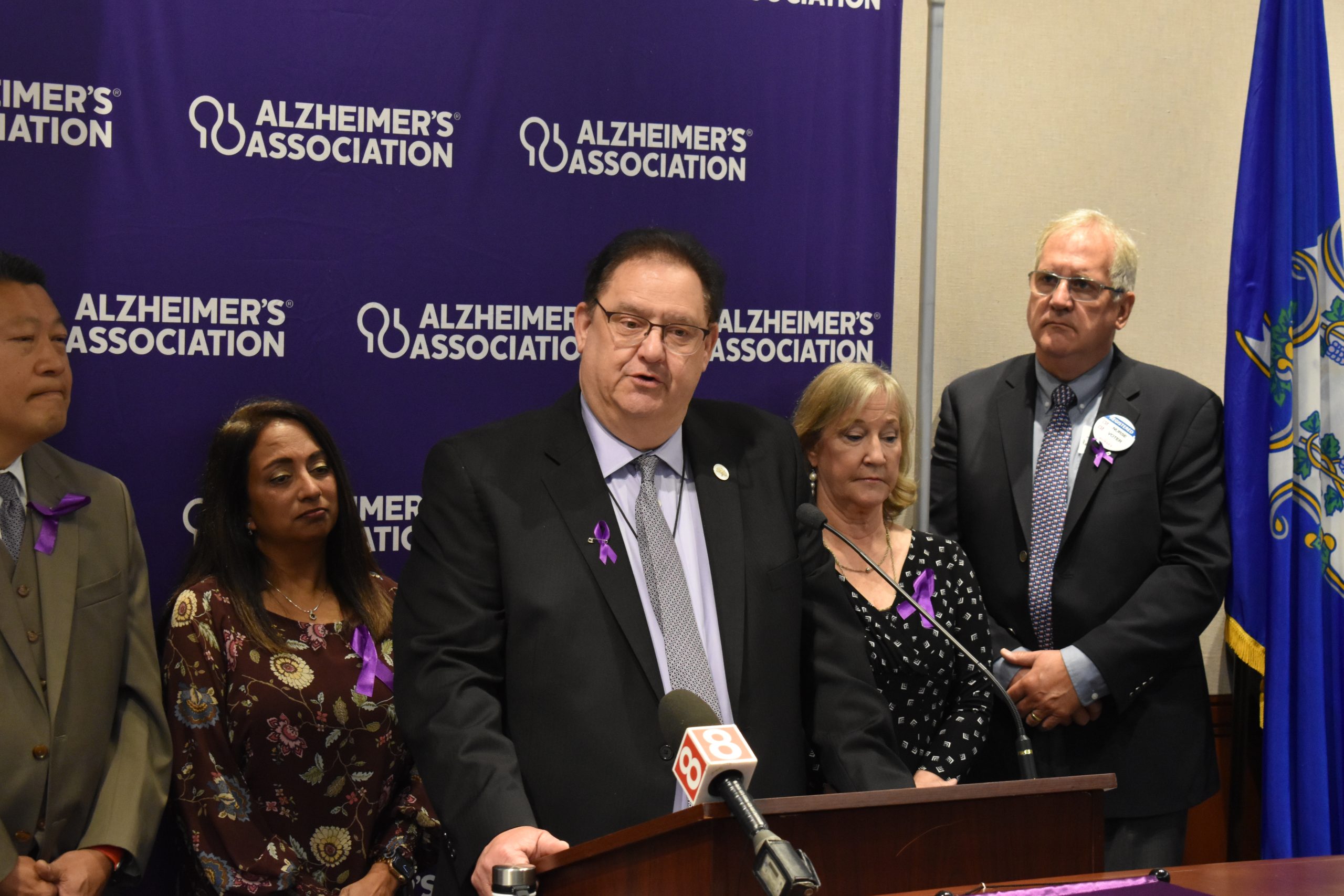

HARTFORD- State Rep. Mitch Bolinsky (R-106) joined 80 fellow-Alzheimer’s advocates on Wednesday May 17 at the State Capitol for a day of advocacy urging Connecticut state lawmakers to support key legislative initiatives to provide critical support for Connecticut’s 80,000 families caring for loved-ones afflicted by Alzheimer’s Disease and other advanced dementias.
Rep. Bolinsky shared his “Why” by relating a bit of family history: “As a 10-year caregiver, this is a cause about which I care deeply and have been legislating for years. Like caring for our loved-ones, this has been a journey, but we’re making good progress and there are potentially life-changing treatments on the immediate horizon. This is a time of great optimism in our fight to find ‘Alzheimer’s First Survivor’.
“The legislation we are pursuing this year recognizes the greater role of family caregivers at a time when many are choosing to take on the challenge of caring for loved-ones at home instead of in nursing-homes, especially after the pandemic’s well-documented tragic nursing-home outcomes. As a society, I think our perceptions of what we consider ‘quality end-of-life care’ and preserving the ‘dignity’ of our loved ones is changing. To keep up with our higher expectations, we must develop the ‘aging-in-place infrastructure’ to support our loved-ones’ and those caring for them. Priority initiatives include bills to expand availability of Caregiver Respite, Adult Day-Centers, and the implementation of our Homemaker-Companion Task Force’s recommendations, adding structure and oversight. Bolinsky concluded: “In the words of my friends at the Connecticut Alzheimer’s Association: ‘Alzheimer’s never quits, and neither do we.”
The legislation being championed by Alzheimer’s advocates in Connecticut’s 2023 Session includes, Senate Bill 931, An Act Expanding Access to The Alzheimer’s Disease Respite Care Program, which would expand eligibility for individuals with Alzheimer’s disease or related disorders to participate in the state’s Respite Care Program. It does so by increasing the program’s (1) annual income limit from $51,114 to $70,000 and (2) annual liquid asset limit from $135,892 to $179,000. The proposal, if passed, will take effect on July 1, 2023 and, like existing law, excludes participants enrolled in the Connecticut Home Care Program for Elders.
Senate Bill 1025, An Act Implementing the Recommendations of the Homemaker-Companion Agency Task Force will ensure appropriate Alzheimer’s and dementia training for non-medical companion care providers, along with moving the state’s licensing and oversight functions into the Department of Public Health. It will also establish Statewide Dementia Coordination under a dedicated State Dementia Services Coordinator whose job will be to ensure coordination of Alzheimer’s programs and policies across state agencies by:
- Overseeing the implementation and updating of the State Alzheimer’s Disease Plan;
- Coordinating Alzheimer’s and dementia work groups and task forces;
- Establishing and maintaining relationships with all relevant state agencies and community organizations to meet community needs and prevent duplication of services;
- Evaluation of existing Alzheimer’s and dementia programs and services;
- Identification of service gaps among state agencies and departments; and
- Increasing awareness of, and facilitating access to quality, coordinated care for people with dementia.
According to the US Census Bureau, Connecticut is the 6th oldest state in the nation, and age remains the biggest risk factor to developing Alzheimer’s disease or other dementias. Today, there are 80,000 people in Connecticut living with Alzheimer’s Disease or other dementias. The Alzheimer’s Association estimates that this number will rise to 91,000 people by 2025, just 2-years from now.
###
